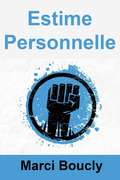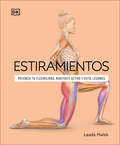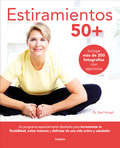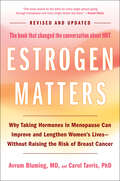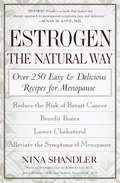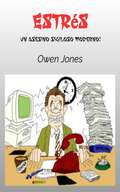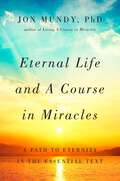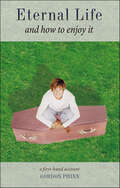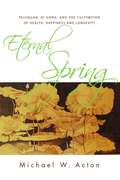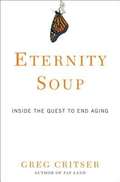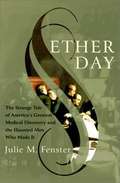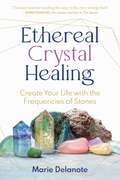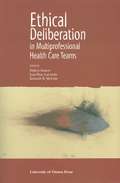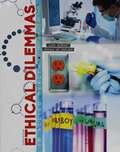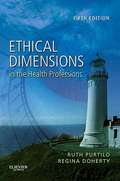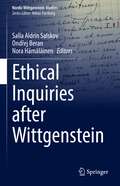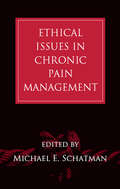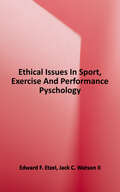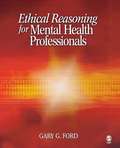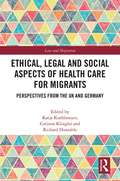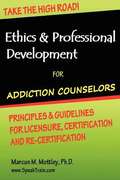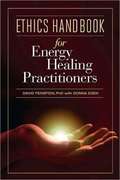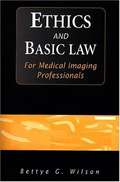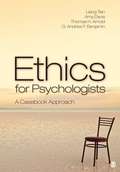- Table View
- List View
Estime Personnelle: Créer une confiance puissante
by Marci BouclyCe livre peut ouvrir votre esprit quant à votre estime personnelle sans limites et inhérente; transformant la manière que vous avez de penser à vous, à la vie, et au monde de manière révélatrice. Vous êtes nés d’une certaine façon. Vous détester est seulement au détriment de votre bonheur. Ce livre va vous montrer comment vous aimer tel que vous êtes et comment arrêter de prendre les critiques et remarques extérieures de manière si sérieuse. Vous êtes ici pour vivre pour vous, donc arrêtez de donner aux autres le pouvoir de vous détruire. Arrêtez de vous détruire, aussi. À la place, élevez vous. Ce livre va procéder étape par étape pour que vous puissiez le faire. Les dessins sont à la fois faits pour être drôles et pédagogiques. Donc nous vous promettons que cela va être un livre qui va vous apprendre de précieuses leçons que vous pouvez mettre en place immédiatement dans votre vie. Si vous êtes prêts à agir et à changer votre vie pour le meilleur, ce livre va pour sûr vous guider dans la bonne direction!
Estiramientos (DK Science of)
by Dr. Leada MalekRelaja tu cuerpo reduciendo la tensión en los músculos y elimina la rigidez en las articulaciones con más de 100 estiramientos.El teletrabajo y el sobreuso de pantallas se ha convertido poco a poco en la nueva normalidad y corremos el riesgo de ser cada vez más sedentarios y perder la funcionalidad muscular. ¿Buscas una solución fácil y eficiente para evitarlo? Con esta guía de estiramientos podrás llevar a cabo una serie de ejercicios variados que te ayudarán a recuperar la movilidad y cuidar tu salud física.Pasa sus páginas y descubre:Más de 100 ejercicios para estirar tus músculos, acompañados de imágenes en 3D, variaciones adaptadas a tus necesidades y toda la información que necesitas para evitar lesiones y evaluar tu progreso.Instrucciones sobre cómo realizar cada ejercicio: cuál es la postura corporal correcta, qué músculos estás trabajando y cómo afectan a los movimientosEntrenamientos adaptados a diferentes habilidades y objetivos, diseñados para que progreses cada semana o cada mes.Basado en las últimas investigaciones sobre los beneficios de los tipos de estiramiento estático, dinámico y FNP (Facilitación Neuromuscular Propioceptiva) y con información sobre cómo integrarlos en tu rutina diaria.Deja atrás las malas prácticas y aprende a estirar tus músculos de manera correcta con Estiramientos, un libro repleto de sesiones de ejercicios, consejos sobre cómo realizarlos de forma segura y calentamientos para mejorar tu rendimiento y lograr tus objetivos con éxito.-------------------------------Loosen tight muscles and stiff joints with over 100 stretches designed to keep you flexible, energized, and pain-free.As working from home becomes the new normal, we risk seizing up, losing muscle functionality, and developing aches and pains from increased sedentary living. Yet, with a regular program of varied stretch workouts, everyone can reach and maintain maximum mobility.Dive straight in to discover:Specially commissioned CGI artworks depict 100 stretch exercises and variations that add or reduce challenge.Artworks detail the mechanics of each exercise, correct body posture, the muscles involved, and how they engage to perform movementsStretch workouts tailored to different abilities and aims provide suggested practices with a progressive increase in challenge over weeks and monthsThe book begins by examining the latest research on the benefits of static, dynamic, and PNF (proprioceptive neuromuscular facilitation) stretching modes. It explains how best to integrate them into your day – and use them safely in a sporting context, alongside warm-ups and exercise sessions, to enhance performance.
Estiramientos 50+
by Dr Karl KnopfMejora tu flexibilidad, mejora tu salud. Un libro de ejercicios y rutinas de estiramientos para mantener un cuerpo sano y flexible pasados los 50. En Estiramientos +50 encontrarás más de 90 rutinas fáciles y seguras para mantener un cuerpo sano y flexible, sin importar la edad. Con solo diez minutos al día de práctica en casa, ayudarás a mejorar tu movilidad, sin dolor ni lesiones. Desde los calentamientos y flexiones más idóneos para el cuerpo hasta ejercicios con bandas elásticas, rodillos o fitballs: descubre los trucos clave para no dejar de estar en forma nunca.
Estrarre gli oli essenziali dalle piante: come utilizzare oli ed erbe per una salute ottimale
by Amber Richards Piera BiffardiScoprite i benefici per la salute derivanti dall'uso degli oli essenziali, per voi e per la vostra famiglia. Estraendoli dalle piante e dalle erbe dei dintorni, avrete la possibilità di risparmiare denaro e sarete certi della loro freschezza. Scoprite ricette e miscele uniche, che vi consentiranno di trattare in maniera naturale molte patologie. Gli oli essenziali, oli volatili o oli eterei sono liquidi concentrati che contengono una combinazione di sostanze chimiche delle piante, utili per molti scopi che avrete la possibilità di approfondire. Possono essere utilizzati per la produzione di profumi, saponi, cosmetici e molti altri prodotti. Nel corso della storia gli oli essenziali hanno svolto, e continuano a svolgere, un ruolo importantissimo nella cura di disturbi come: ✔ Raffreddori e influenza ✔ Artrite ✔ Insonnia ✔ Sistema immunitario debole ✔ Bronchite ✔ Acne ✔ Graffi e tagli poco gravi ✔ Affaticamento ✔ Problemi digestivi ✔ Pressione alta ✔ E TANTO ALTRO! In questo e-book vengono svelati metodi semplici per produrre i propri oli essenziali direttamente da piante ed erbe, nonché molte ricette per affrontare questi problemi di salute e per molti altri usi. Questa guida vi fornisce una panoramica generale della storia degli oli essenziali e termina illustrando metodi molto semplici per distillare, miscelare e utilizzare gli oli essenziali in molte situazioni diverse. Sperimentate in prima persona i miglioramenti di salute e l'aumento di energia, derivanti dall'utilizzo degli oli essenziali.
Estrogen Matters: Why Taking Hormones in Menopause Can Improve Women's Well-Being and Lengthen Their Lives -- Without Raising the Risk of Breast Cancer
by Carol Tavris Avrum BlumingA compelling, &“fascinating&” (Robert Cialdini) defense of hormone replacement therapy, exposing the faulty science behind its fall from prominence and giving women the evidence they need to make informed decisions about their health. Now fully revised and updated."Estrogen Matters was my antidote to the misinformation surrounding menopause. This book should be the bible for every single person going through menopause.&”―Naomi Watts For years, hormone replacement therapy (HRT) was the medically approved way to alleviate menopausal symptoms (ranging from hot flushes to brain fog) and reduce the risk of heart disease, Alzheimer's, and osteoporosis. But when a large study by the Women's Health Initiative (WHI) announced, with national fanfare, that women taking HRT had an increased risk of breast cancer, women were scared off, and the treatment was abandoned. Now, Dr. Bluming, a medical oncologist, and Dr. Tavris, a social psychologist, reveal the true story of the WHI&’s efforts to distort their data to exaggerate unsupported claims of estrogen&’s harms. Important updates in this edition include: Evidence that demolishes the WHI&’s claim that HRT causes breast cancer. A list of the WHI&’s retractions of their original scare stories. Updated findings on estrogen&’s benefits on heart, brain, bones, and longevity. A critical review of the alternative products and medications being marketed to treat symptoms of menopause. A sobering and revelatory read, Estrogen Matters sets the record straight on estrogen&’s benefits, providing a light to guide women through this inevitable phase of life.
Estrogen: The Natural Way
by Nina ShandlerWomen need estrogen, but estrogen levels diminish with age. In the short term, estrogen's departure leaves most women in a frequently overheated, uncomfortable state. In the long term, its exodus places their hearts, bones, and brains in harm's way. And conventional hormone replacement therapy, with its potentially distressing side effects and increased risk of breast cancer, doesn't provide a reassuring rescue. Faced with every menopausal woman's frightening estrogen dilemma, Nina Shandler discovered exciting news: Some foods contain estrogen. She headed straight for the kitchen and created this easy-to-swallow alternative. Part eating program, part cookbook, Estrogen: The Nat-ural Way shows women how to make fast, fun food using nature's estrogenic ingredients. From breakfast bars to soups, from main courses to desserts, Estrogen: The Natural Way provides a gentle yet effective version of estrogen replacement therapy.From the Trade Paperback edition.
Estrés: Un asesino sigiloso moderno (¿Cómo...? #37)
by Owen JonesEstrés – Un asesino sigiloso moderno es una guía introductoria para el entendimiento y manejo del estrés en el mundo acelerado de hoy. El libro adopta un enfoque holístico para el manejo del estrés, analizando las causas, los síntomas y los efectos de este, así como estrategias practicas para reducir el estrés y mejorar el bienestar general. A través de este libro, el lector aprenderá sobre diferentes tipos de estrés, como el estrés agudo, el estrés crónico y el estrés traumático; y como cada uno afecta al cuerpo y la mente de manera diferente. El autor también profundiza en los cambios fisiológicos que ocurren en el cuerpo cuando está bajo estrés y como estos cambios pueden conducir a problemas de salud graves, como cardiopatías, diabetes y problemas de salud mental como depresión y ansiedad. El libro también ofrece una variedad de técnicas prácticas para reducir el estrés, como la atención plena y la meditación, el ejercicio y la gestión del tiempo, y cómo incorporar estas técnicas en la vida diaria. También cubre cómo establecer límites personales e identificar y evitar factores estresantes que están fuera de nuestro control. Uno de los aspectos más completos es que también cubre algunos conceptos erróneos comunes sobre el estrés y su manejo y cómo distinguir el estrés bueno del estrés malo y equilibrar el estrés bueno con un nivel manejable de estrés malo. En general, “Estrés, un asesino sigiloso moderno” es un recurso introductorio esencial para cualquier persona que busque comprender y manejar mejor el estrés en sus vidas. Está escrito en un lenguaje fácil de entender, lo que lo hace accesible a lectores de todos los orígenes y niveles de conocimiento. El libro es una lectura obligada para cualquier persona interesada en mejorar su salud física y mental, y lograr una mayor sensación de bienestar. Espero que encuentre la información de ayuda, útil y provechosa.<br
Eternal Life and A Course in Miracles: A Path to Eternity in the Essential Text
by Jon MundyYou do not live here. We are trying to reach your real home. We are trying to reach the place where you are truly welcome. We are trying to reach God. —A Course in Miracles W-49.4:5 There is no bigger mystery, nothing more compelling than the desire to know about &“life after life.&” Jon Mundy, the respected longtime teacher and interpreter of A Course in Miracles, now investigates that enigma, using insights from the Course on mortality, death, and the afterlife. Mundy discusses facing death and learning to let go, the ephemeral nature of the physical body and the eternal reality of the mind, and the reawakening of our Spirit as the one, true home. It&’s a book filled with hope—and a way to alleviate our fear of death.
Eternal Life and How to Enjoy It: A First-Hand Account
by Gordon PhinnDead and Loving Every Minute of it!Eternal Life and How to Enjoy It is a real-life tour of what awaits us in the afterlife, as told by a guide Henry, who just happens to be dead. Author Gordon Phinn has been in communication with Henry for many years and brings us the tragicomic tale in his own inimitable style.Henry, a so-called "boring accountant," relates how--immediately after being killed in a car crash--he is welcomed by the affable Jack, who guides him on his first day dead. We see this new world through Henry's eyes and feel his amazement at every turn. Even better, we witness this stuffy "bean counter" let go of his suffering and guilt and turn into the fun-loving, carefree soul he truly is.After Henry gets used to the place, he becomes an afterlife guide himself, indulging the newly deceased in any whim or fantasy that will help them to "wake up and realize they're dead." Henry explains that most people have the afterlife experience their cultural and religious belief systems set them up for--including all the heavens, all the hells, and all the purgatories in between. When really, he says, we can view the afterlife as a constant progression towards the reunion with the god consciousness that we put aside to practice the art of being human.
Eternal Spring: Taijiquan, Qi Gong, and the Cultivation of Health, Happiness and Longevity
by Michael ActonThe traditional arts of Taijiquan and Qi Gong are sophisticated expressions of Chinese martial. health and spiritual culture. Rooted in China's ancient past they are still practised by many people in China today to achieve good health, mental well-being and a long and active life; commonly called `Eternal Spring'. This book, written for a Western audience, explains the essential theories and strategies of Taijiquan and Qi Gong in an insightful and accessible way. It expounds their value in our daily lives as a most effective means of combating the stresses, strains and illnesses that are now so much a part of our modern lifestyle and positions these two disciplines as the most comprehensive strategies for health, happiness and rejuvenation currently available. Michael W. Acton guides the reader through core concepts with an insight and wisdom borne out of many years of practice, study and teaching. This book will be of use to anyone who is already on this path or who is interested in self-development, health and well-being or the fascinating philosophy and ideas that underpin these traditional Chinese disciplines.
Eternity Soup: Inside the Quest to End Aging
by Greg CritserMix the latest and most rigorous scientific research, irrepressible old-fashioned entrepreneurship, and the ancient human desire to live forever (or at least a lot longer) and the result is today's exploding multibillion-dollar antiaging industry. Its achievements are so far mostly marginal, but its promises flow with all the allure of a twenty-first-century fountain of youth. In Eternity Soup, acclaimed science writer Greg Critser takes us to every outpost of the antiaging landscape, home to zealots and skeptics, charlatans, and ingenious clinicians and academics. We visit a conference of the Caloric Restriction Society, whose members-inspired by certain laboratory findings involving mice-live their lives in a state just above starvation. ("It's only the first five years that are uncomfortable," says one. ) We meet the new wave of pharmacists who are reviving the erstwhile art of "compoundingr"using mortar and pestle to mix extravagantly profitable potions for aging boomers seeking to recapture flagging sexual vitality. Here, too, are the theorists and researchers who are seeking to understand the cellular-level causes of senescence and aging and others who say, Why bother with that? Instead, we should just learn how to repair and replace organs and tissue that break down, like a vintage automobile collector who keeps a century-old Model T shining and running like new. Eternity Soupis a simmering brew of testosterone patches, human growth hormone (so promising and so potentially dangerous), theories that view aging as a curable disease, laboratory-grown replacement organs ("I want to build a kidney," says one proponent. "It is such a stup-eed organ!"), and bountiful other troubling, hilarious, and invigorating ingredients. Critser finds plenty of chicanery and credulousness in the antiaging realm but also a surprising degree of optimism, even among some formerly sober skeptics, that we may indeed be on the cusp of something big. And that elicits its own new set of concerns: How will our society cope with a projected new cohort of a million healthy centenarian Americans? How will they liberate themselves from the age segregation that shunts them off to "Godr"s Waiting Rooms"in the sunbelt? Where will they find joy and meaning to match the inevitable loss that comes with longevity? Eternity Soup is an illuminating, wry, and provocative consideration of a long-dreamed-about world that may now be becoming a reality.
Ether Day: The Strange Tale of America's Greatest Medical Discovery and the Haunted Men Who Made it
by Julie M. FensterEther Day is the unpredictable story of America's first major scientific discovery -- the use of anesthesia -- told in an absorbing narrative that traces the dawn of modern surgery through the lives of three extraordinary men. Ironically, the "discovery" was really no discovery at all: Ether and nitrous oxide had been known for more than forty years to cause insensitivity to pain, yet, with names like "laughing gas, " they were used almost solely for entertainment. Meanwhile, patients still underwent operations during which they saw, heard, and felt every cut the surgeon made. The image of a grim and grisly operating room, like the one in Mary Shelley's Frankenstein, was in fact starkly accurate in portraying the conditions of surgery before anesthesia. With hope for relief seemingly long gone, the breakthrough finally came about by means of a combination of coincidence and character, as a cunning Boston dentist crossed paths with an inventive colleague from Hartford and a brilliant Harvard-trained physician. William Morton, Horace Wells, and Charles Jackson: a con man, a dreamer, and an intellectual. Though Wells was crushed by derision when he tried to introduce anesthetics, Morton prevailed, with help from Jackson. The result was Ether Day, October 16, 1846, celebrated around the world. By that point, though, no honor was enough. Ether Day was not only the dawn of modern surgery, but the beginning of commercialized medicine as well, as Morton patented the
Ethereal Crystal Healing: Create Your Life with the Frequencies of Stones
by Marie Delanote• Shares practical and powerful energy work and attunement techniques for working with the energies of crystals whether they are physically present or not as well as how to create ethereal gem elixirs for specific healing and manifestation goals• Explores the healing and creative powers of 33 ethereal crystals, including Kirlian photography of their auras• Explains how to use ethereal crystal healing practices to heal the body, heal animals, improve relationships, and manifest abundance and successSimilar to remote energy healing, working with the ethereal energy of a crystal allows you to engage with highly potent crystal frequencies anywhere, without the need to have the crystal physically at hand. Stones in their nonphysical form are said to have an even stronger energetic effect than physical crystals.In this illustrated guide, master teacher Marie Delanote discusses the healing and creative powers of 33 ethereal crystals, detailing best uses from career support to health issues and emotional cleansing. Gemstones are imbued with palpable energy whose frequencies can be intuited, felt, and tuned in to. Sharing practical and powerful energy work and attunement techniques, Marie explains how to connect with and invoke these frequencies. Ethereal crystal healing practices can be employed to raise your consciousness, heal animals, cleanse the energies of buildings, improve relationships, and heal the body also through direct energetic interaction with the internal organs. Inspiring examples highlight how these energies can help transform thinking patterns, physical issues and illnesses, emotional pain, family patterns, as well as generational trauma.Presenting a unique energetic method for personal transformation, Ethereal Crystal Healing will teach you how to heal, how to change, and how to manifest your desires.
Ethical Deliberation in Multiprofessional Health Care Teams
by Hubert Doucet Jean-Marc Larouche Kenneth R. MelchinThis study analyzes both pragmatic and theoretical perspectives of ethical deliberation, as well as the professional and philosophical backgrounds for the ethical deliberation of social workers, nurses and doctors working in the field of chronic illness. In doing so, this volume expands the scope of current research through an analysis of the process and its dynamics.
Ethical Dilemmas in Allied Health
by Janine M IdziakOver the past several decades, health care ethics has developed and flourished as an academic discipline. The field now includes a standard set of topics. Issues such as abortion, assisted reproduction, terminating life-sustaining treatment, euthanasia and physician aid-in-dying, confidentiality, and the allocation of scarce medical resources are commonly covered in textbooks on health care ethics. However, the perspective assumed in these textbooks may be limited in com¬parison with the actual range of health care services and types of health care professionals. Case studies on ethical dilemmas typically focus on physicians and nurses in a hospital setting. This textbook, on the other hand, approaches the standard problems of health care ethics from the perspective of the allied health fields. Case studies always involve allied health professionals, giving recognition to them as an integral part of the care giving team.
Ethical Dimensions in the Health Professions
by Ruth B. Purtilo Regina F. DohertyIdeal for all health care professionals, Ethical Dimensions in the Health Professions, 5th Edition provides a solid foundation in basic ethical theory, the terms and concepts of ethics, and current ethical issues. Expert authors Ruth Purtilo and Regina Doherty outline a unique 6-step decision-making process as a guide to making effective choices that lead to a professional and caring response to patients. They also suggest practical approaches to commonly encountered clinical issues such as confidentiality, informed consent, information sharing, and end-of-life care. With this book, you will develop the skills you need to recognize, understand, and resolve ethical problems.
Ethical Inquiries after Wittgenstein (Nordic Wittgenstein Studies #8)
by Nora Hämäläinen Ondřej Beran Salla Aldrin SalskovThis volume showcases contemporary, ground-up ethical essays in the tradition of Wittgenstein’s broader philosophy and Wittgenstein-inspired ethical reflection. It takes the ethical relevance of Wittgenstein as a substantial and solid starting point for a broad range of ongoing thinking about contemporary ethical issues.The texts are organised in two sections. The first consists of chapters exploring questions around what could be called the “grammar” of our moral forms of life, and thus represents a more traditional approach in ethics after Wittgenstein. The second part represents a recent turn in the tradition towards investigating moral conceptions, perspectives and concepts that are undergoing change, either because the world itself is changing (for instance with new technologies) or because human agency, such as social movements, has brought us to reconsider previously unquestioned ideas and structures.Within the book, the authors’ contributions are inspired, in their ways of working with ethical questions, by Wittgenstein’s conceptions of language, understanding and the nature of philosophical inquiry. This book is of interest to philosophers influenced by Wittgenstein, as well as to all ethicists seeking ideas for how to do philosophy in a manner close to lived experience and practice.
Ethical Issues in Chronic Pain Management (Pain Management Ser. #Vol. 1)
by Michael E. SchatmanSpecifically designed to address the needs of all specialists involved in the care of chronic pain patients, this source clarifies the ethical and legal issues associated with the diagnosis, assessment, and care of patients suffering from long-term pain. Divided into five comprehensive sections, this source covers a variety of topics to help the ch
Ethical Issues in Sport, Exercise, and Performance Psychology
by Edward Etzel Jack C. WatsonThis book focuses attention on the range of unique ethical, legal, and related professional challenges faced by those who work in the areas of sport, exercise, and performance psychology. Ethical Issues in Sport, Exercise, and Performance Psychology is organized into four sections: ethical practices, specific populations, special settings, and academic issues. Professionals in higher education, university counseling centers, sports medicine clinics, and private practice, as well as students, will find this book an informative personal resource.
Ethical Reasoning for Mental Health Professionals
by Gary G. FordThe definition of ethics and how to apply it to the mental health profession.
Ethical, Legal and Social Aspects of Healthcare for Migrants: Perspectives from the UK and Germany (Law and Migration)
by Richard Huxtable Katja Kuehlmeyer Corinna KlinglerNumerous important issues arise in relation to the health of, and healthcare for (and by), migrants. Much commentary on the migrant crisis and healthcare has focused on the allocation of resources, with less discussion of the needs of, and provision for, migrants. Presenting a comparative perspective on the UK and Germany, this volume increases knowledge of a broad spectrum of challenges in healthcare provision for migrants. ‘Migration’ is deliberately understood in its broadest sense and includes not only migrant patients but also migrant healthcare professionals. The book’s content is diverse, with insights from healthcare ethics, healthcare law, along with clinical perspectives as well as perspectives from the social sciences. The collection provides normative reflections on current issues, and presents data from empirical studies. By informing researchers, politicians and healthcare practitioners about approaches to challenges arising in healthcare provision for migrants, the collection seeks to inform the development of adequate and ethically appropriate strategies.
Ethics And Professional Development For Addiction Counselors: Principles, Guidelines And Issues For Training, Licensing, Certification And Re-certification
by Marcus MottleyIn Ethics & Professional Development for Addiction Counselors, Dr. Marcus Mottley defines and clarifies a wide number of ethical issues and dilemmas involving conflicts of interest, boundary issues, confidentiality, professional behaviors and the core obligations, roles and responsibilities of addiction counselors. Addiction professionals who use this book will become highly aware of their own values, attitudes and behaviors and how these might impact their professional conduct and their relationships with clients. Counselors will also gain insights and get clarification on key topics such as documentation, self-disclosure, dual relationships, cultural competence and HIPAA guidelines. Ethics & Professional Development for Addiction Counselors is a concise manual that includes the twelve principles of ethics, eleven principles of professional development and key guidelines, issues and information that are part of the core knowledge requirements for the licensing, certification and re-certification of addiction counselors. Ethics & Professional Development is a precise, no fluff, get-right-to-the-point guide, reference and training manual for counselors, therapists, healthcare professionals and others interested in the field of addictions and the treatment of alcoholism and drug use.
Ethics Handbook For Energy Healing Practitioners
by David FeinsteinEthical principles are far more than mere rules or regulations - they are maps for bringing out your best as a caregiver and healer. Responding to a lack of articulated or standardized ethical guidelines for energy healing practitioners, David Feinstein, PhD, and Donna Eden developed a professional curriculum that has become one of the country's most successful and effective energy medicine certification programs. Now, this comprehensive, case-oriented guide allows veterans of the field and newcomers alike to work through a wide range of ethical dilemmas before they arise, helping you to prevent professional errors that could hurt you, your clients, and your practice.
Ethics and Basic Law for Medical Imaging Professionals
by Bettye G. WilsonComplies with ASRT curriculum guidelines requiring coverage of ethical theory, behavior, and dilemmas; legal responsibilities; and patient consent. Provides coverage of special issues, such as the impaired colleague and special patient populations, including the terminally ill patient and the patient with an infectious disease. Discussion questions facilitate classroom discussion and student analysis. Each chapter includes objectives and an end-of-chapter summary.
Ethics for Psychologists: A Casebook Approach
by Liang Tien Amy Davis Thomas H. Arnold Andrew F. BenjaminEthics for Psychologists provides unique multicultural, moral, and legal perspectives to the standards of conduct in the field of psychology. The book describes complex ethical dilemmas students may encounter and offers a variety of frameworks through which to examine such dilemmas.
